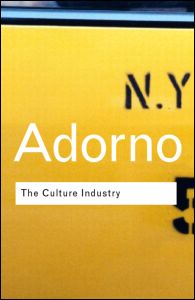 The Culture Industry: Selected Essays on Mass Culture, London, Routledge.
The Culture Industry: Selected Essays on Mass Culture, London, Routledge.
by Theodor Adorno
The creation of the Frankfurt School of critical theory in the 1920s saw the birth of some of the most exciting and challenging writings of the twentieth century. It is out of this background that the great critic Theodor Adorno emerged. His finest essays are collected here, offering the reader unparalleled insights into Adorno’s thoughts on culture. He argued that the culture industry commodified and standardized all art. In turn this suffocated individuality and destroyed critical thinking. At the time, Adorno was accused of everything from overreaction to deranged hysteria by his many detractors. In today’s world, where even the least cynical of consumers is aware of the influence of the media, Adorno’s work takes on a more immediate significance. The Culture Industry is an unrivalled indictment of the banality of mass culture.
“All are free to dance and enjoy themselves, just as they have been free, since the historical neutralisation of religion, to join any of the innumerable sects. But freedom to choose an ideology – since ideology always reflects economic coercion – everywhere proves to be freedom to choose what is always the same.” Enlightenment as Mass Deception 1944
Theodor Adorno was a German sociologist, philosopher and musicologist known for his critical theory of society. He was a leading member of the Frankfurt School of critical theory, whose work has come to be associated with thinkers such as Ernst Bloch, Walter Benjamin, Max Horkheimer and Herbert Marcuse, for whom the work of Freud, Marx and Hegel were essential to a critique of modern society. He is widely regarded as one of the 20th century’s foremost thinkers on aesthetics and philosophy, as well as one of its preeminent essayists. As a critic of both fascism and what he called the culture industry, his writings—such as Dialectic of Enlightenment (1947), Minima Moralia (1951) and Negative Dialectics (1966)—strongly influenced the European New Left.